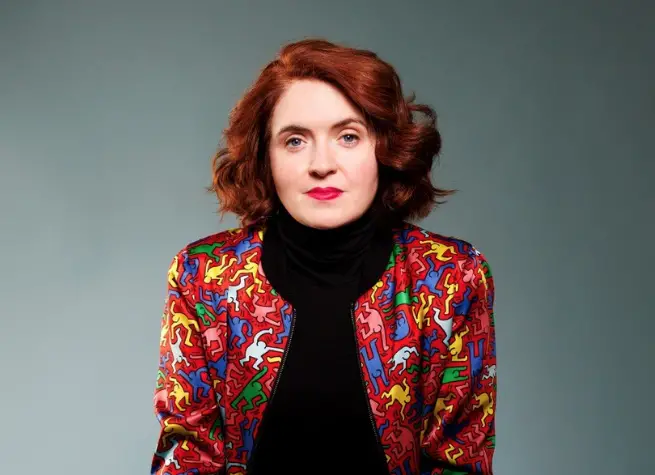After a nationwide search, the committee to find a new CEO for ArtsWestchester concluded that the right person was there all along.
Kathleen Reckling, COO of the 59-year-old, White Plains-based arts council, has been named to succeed Janet T. Langsam, effective July 1. Langsam will become CEO emerita in recognition of her longtime leadership of the arts in Westchester County.
“In appointing Kathleen as our next CEO, the ArtsWestchester board affirms our confidence in Kathleen’s leadership abilities and strategic expertise expressed in her numerous ArtsWestchester successes, achievements and her commitment to the Westchester arts community and affiliates,” said Marie Smith, president of ArtsWestchester’s board of directors. “Kathleen’s vision for ArtsWestchester will build on the organization’s notable legacy and further enhance ArtsWestchester’s mission to bring the arts to all Westchester residents.”

Interviewed in her office Tuesday, May 21, Reckling said she was excited about the opportunity and not just because of what ArtsWestchester has meant for the artists and organizations it serves but because of its role as a voice for arts and culture in the wider region. Now she wants to see how the nonprofit – which many arts observers consider to be the flagship arts council in New York state – can continue to grow, and not just in terms of grant-making but in the services it offers. Grant-making, however, is a large part of ArtsWestchester’s mission, with the organization, which has an operating budget of $6.8 million and a staff of 25, awarding more than $2 million last year to 200 artists and organizations, including $500,000 in Arts Alive grants.
Reckling – who started as an unpaid intern at ArtsWestchester in 2008, after her father handed her an article on Langsam, rising and overlapping as gallery director, director of public programs, chief curator, senior deputy director and COO – is particularly adept at grant-making, having secured more than $3 million in funding from federal and state sources, including the National Endowment for the Arts (NEA) and the New York State Council on the Arts (NYSCA) since 2014. But she is also equally skilled at seeing issues, especially that of the arts in relation to American society, in their complexity.
Asked about the challenge for the arts in a nation and educational system that prefer STEM for its usefulness and career opportunities, Reckling takes a moment to put on her art historian’s hat – she holds a Master of Arts in art history as well as a Bachelor of Arts in economics, both from Columbia University – to remind us that for many of the early colonists, the arts were nothing more than a handsome chest of drawers, a utilitarian object, whereas the indigenous peoples have seen art as part of ritual and everyday life.
There remains a tension in the United States’ relationship to the arts, Reckling added. On the one hand, President Joe Biden signed an executive order that integrates the arts into every department of the federal government, while locally ArtsWestchester celebrations like the May 11 Family ArtsBash, which drew 300 families, and the Mooncake Night Market last September, were packed.
On the other hand, Reckling said, “one of the challenges has been an uneven post-pandemic recovery in which some arts organizations have not been able to pivot…. And there’s the challenge of corporate giving, which has been shrinking locally and nationally,” perhaps, she added, because society’s needs are great.
And yet, the arts have stepped up to help fill some of those needs, with ArtsWestchester working with the Westchester County Department of Community Mental Health for some 20 years. And the arts offer a creativity and innovation that parallel and dovetail with STEM and business models, she said. Gesturing to a model of a future abstract sculpture for neighboring City Center, she noted that art can require a lot of math and engineering. (Reckling has been at the helm of many of ArtsWestchester’s other public art projects, from Amanda Browder’s six-story textile installation “Metropolis Sunrise,” which enveloped the organization’s building, Christo-like; to the 10 artworks on the Gov. Mario M. Cuomo Bridge; to “Peaceful Journey,” Eto Otitigbe’s two-story monument to hip-hop artist Heavy D, as Dwight Myers was professionally known, in Mount Vernon.)
Born in New York City, Reckling grew up in Ardsley, where she still lives, in a small family that saw no conflict between culture and commerce, STEM and the arts and humanities. Her South African father, Keith, was a rugby player who worked in the engineering field, while her Canadian mother, Diane, was a banker. Their only child was playing the violin at 7 and dining out with adults, crayons and coloring books in tow.
As a child, she played in local youth orchestras. As a student at Ardsley High School and Columbia, she was equally drawn to the balletic, rhythmic sport of fencing – competing in two U.S. Olympic trials and captaining the Columbia University Fencing Team to a top three finish at the 2007 NCAA Division 1 Championships and to the Ivy League Conference Championship title. (At Ardsley High, Mark Zuckerberg, Meta Platforms chair and CEO, was a teammate.) In 2021, Reckling retired from coaching the championship Ardsley High School varsity teams but said that she and her mother still oversee the varsity teams for Section 1, which represents public high schools in Westchester, Rockland and Dutchess counties.
Fencing not only shares a problem-solving component with the arts, Reckling added; its World Cups gave her entrée to scores of museums in both hemispheres.
“I learned about the places through the arts,” she said.
When she’s out at events – arm and arm with her mother, the two like twin standouts with their identical Titian-tinged bobs and stylish attire – she’s often approached by the conductors who once led her performances or the students she coached. Now, however, they will see her in a new guise – as a CEO.
Touché.
For more, visit artswestchester.org.




















